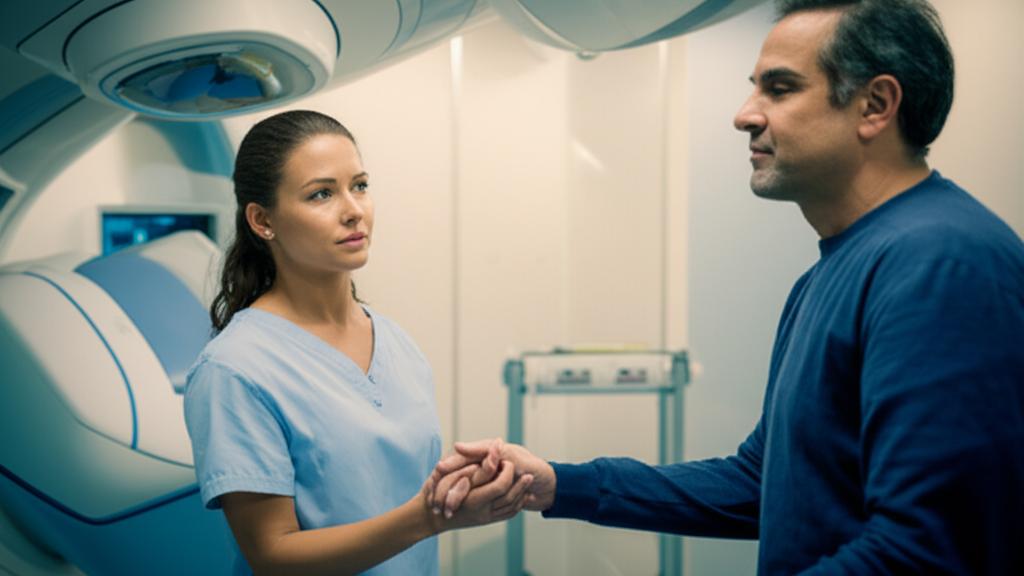That big machine. I get it. When you first walk into a radiation therapy suite, it can feel… well, a bit overwhelming. Lots of high-tech equipment, quiet hums. And you’re likely there because you, or someone you love, is facing something pretty serious, often cancer. It’s a heavy load to carry. But right there with you, there’s a special healthcare professional whose main job is to guide you, support you, and make sure your treatment is as safe and effective as possible. That’s your radiation therapist. They’re a key part of the team fighting alongside you.
So, Who Exactly is Your Radiation Therapist?
Think of a radiation therapist as your day-to-day expert and friendly face during radiation oncology treatments. Radiation oncology, by the way, is just the medical field that uses radiation to treat diseases. These therapists work very closely with your radiation oncologist – that’s the doctor who plans and oversees your entire radiation treatment course.
What will your radiation therapist actually do? Quite a bit, actually!
- Treatment Prep: They’re deeply involved in the planning stages. This means they help make absolutely sure the radiation is aimed precisely where it needs to go, and only there. Precision is key.
- Keeping You Safe: A huge part of their role is protecting you from any unnecessary radiation. They’re experts in safety protocols.
- Running the Show (Safely!): They operate those complex machines that deliver the radiation.
- Checking In: They’ll keep a close eye on how you’re doing during each session and throughout your treatment.
- Quick Response: If anything seems a bit off, or if you have an unusual reaction, they’re the ones who will flag it immediately to the radiation oncologist or other team members.
- Dotting I’s and Crossing T’s: They meticulously maintain detailed records of your treatments.
I’ve seen in my practice how much comfort patients draw from having a consistent, caring radiation therapist by their side. It makes a tough journey a little bit easier.
Where Will You Meet Them?
Most radiation therapists work in hospitals. That’s where a lot of this specialized equipment lives. But you might also find them in doctors’ offices that offer radiation therapy or dedicated outpatient treatment centers.
The Path to Becoming a Radiation Therapist
It takes dedication to become a radiation therapist. Here’s a peek at their journey:
- Education: They’ll typically earn an associate’s degree (that’s usually two years) along with hands-on clinical training with a radiation oncology team. Or, they might complete a four-year bachelor’s degree specifically in radiation therapy.
- Certification: They need to pass a rigorous certification program. In the U.S., this is often through the American Registry of Radiologic Technologists (ARRT).
- State License: Finally, they get a state license to officially become a registered technologist.
How long does all that take? Well, the schooling is two to four years. Then, preparing for and passing that ARRT exam can take some months. They have to take the exam within three years of finishing their degree. It’s a commitment, for sure.
A Few More Things You Might Be Wondering
Radiation Oncologist vs. Radiation Therapist: What’s the Difference?
It’s a great question, and one I hear a lot. Your radiation oncologist is the doctor who leads the whole radiation treatment team. They’re the ones with many more years of training – think four years of college, four years of medical school, a year of general medical or surgical training, and then another four years specializing just in radiation oncology. They design your overall treatment plan.
Your radiation therapist, on the other hand, is the highly skilled professional who carries out that plan, works directly with you during each treatment session, and manages the technical aspects of delivering the radiation safely. They are vital members of that team.
Will They Use Needles?
This is a common concern! Generally, radiation therapists don’t give injections or draw blood. If they do use a very, very tiny needle, it’s usually to make a few small, precise tattoos on your skin. These little dots act like a map to make sure the radiation machine lines up perfectly for every single treatment. They’re super important for accuracy.
What’s the Toughest Part of Their Job?
Being a radiation therapist is incredibly rewarding, but like any job in healthcare, it has its challenges.
- Attention to Detail: This is a big one. From the initial planning (often called simulation) right through every treatment, they have to be laser-focused. There’s no room for error when you’re dealing with radiation.
- Machine Masters: They’re responsible for those complex machines, making sure they’re working perfectly.
- The Human Side: Let’s be honest, facing radiation therapy often means you’re feeling anxious, maybe scared. A huge, and I think beautiful, part of a radiation therapist’s job is to offer compassion, to listen, and to help ease those fears. They see people at a very vulnerable time.
Your Radiation Therapist: Key Things to Remember
When you’re going through something like cancer treatment, having the right team around you is so important. Your radiation therapist is a crucial part of that team.
- They are highly trained healthcare professionals specializing in delivering radiation therapy.
- They work under the direction of a radiation oncologist.
- Their focus is on accurate treatment delivery, your safety, and your comfort.
- They operate the treatment machines and monitor you closely.
- Don’t hesitate to ask them questions – they’re there to help you understand.
You’re not just a case file to them. You’re a person, and they’re there to help you through this. You’re in good hands.


